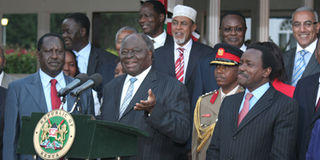Local courts to try Waki list suspects

President Kibaki addresses journalists at State House on 30th July 2009. PHOTO/MICHAEL MUTE
What you need to know:
- But those indicted by The Hague will be handed over to Ocampo, says Cabinet
A divided Cabinet on Thursday gave up on a local tribunal and decided to clean up the police force and the local courts and have them try post election violence suspects.
But it will also hand over those indicted by the International Criminal Court to chief prosecutor Luis Moreno-Ocampo.
And it will change the law to give the Truth, Justice and Reconciliation Commission more teeth besides making its membership more widely accepted.
The Cabinet is desperately divided with some of its members suspected to have either masterminded or funded the election violence in which more than 1,133 people killed and about 650,000 evicted from their homes.
Overcome differences
Thursday’s decision appears to be an admission that the Cabinet was unable to overcome differences among its members.
It will also likely disappoint many countries, such as the European Union and the US, which have been pressing Kenya to form a special tribunal.
Both the police and the courts are woefully inefficient, enjoy very little confidence from the public and are the reason for widespread impunity.
The Cabinet decision was announced by President Kibaki, flanked by Prime Minister Raila Odinga and the entire Cabinet at State House, Nairobi.
The six-hour meeting, the third in two weeks, was described by Cabinet ministers who attended it but can not named because the sessions are confidential, as “stormy”.
Speaking on the lawns of State House, President Kibaki said: “They (suspects) will be tried locally. We are not saying anything about a special tribunal. We are able to try anybody and the laws are there.”
Asked whether the government had abandoned the idea of setting up a special tribunal, the President Kibaki replied: “We have not abandoned anything at all; so don’t bring anything that you have been imagining out there. We have not abandoned it since we have not created it.”
Extensive reforms
Mr Odinga said: “The Cabinet has decided to carry out extensive reforms of the Judiciary, police and investigative arm of government to try the suspects locally.”
The tension among the ministers as the decision was announced, however, tended to suggest that the matter was far from settled.
Some ministers wanted The Hague as the only option, while others wanted a local tribunal with the powers to try anyone. Yet a third group preferred national healing and reconciliation.
In the Cabinet statement, the President said the government had committed itself to “undertake accelerated and far-reaching reforms” in its various arms as part of the Agenda Four of the national accord which was hammered out to end the post-election violence.
The decision was based on one of the options given to the Cabinet by a sub-committee led by Justice minister Mutula Kilonzo.
The special tribunal draft Bill prepared by the team was rejected by Cabinet because it proposed to strip the President of immunity from prosecution.
The other options were: Setting up of a special division of the High Court with international participation; directly referring the suspects to The Hague; withdrawing from the Rome Statute altogether or forming an independent special tribunal to try suspects locally.
The High Court is provided for under Section 8 of the International Crimes Act which defined the crimes against humanity. “A trial authorised by this section to be conducted in Kenya shall be conducted in the High Court,” the law says.
The reformed High Court will also deal with all forms of impunity, including extra-judicial killing, corruption and land grabbing.
By choosing the High Court, the Cabinet went outside the recommendations of the Waki Commission.
The agreement between the government and Mr Moreno-Ocampo early last month required Kenya to set up a credible judicial mechanism to try the suspects.
Ministers who attended Thursday’s session said the option of taking the suspects directly to the Hague was rejected.
Sources at the meeting said the three camps in the Cabinet took hard line positions on the local tribunal, making it impossible for the Cabinet to adopt it.
Immunity
Ministers allied to the PNU side opposed the Bills on grounds that stripping the President of his immunity amounted to stating that his name was on the list of suspects.
They demanded that the clauses be deleted. Some of them were categorical that Kenya should not allow The Hague to take over the case.
ODM ministers, on their part, pushed for retention of the clauses, arguing that they were in line with international law.




